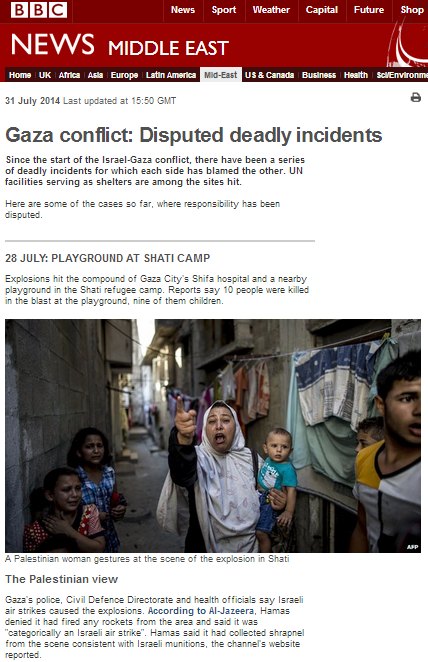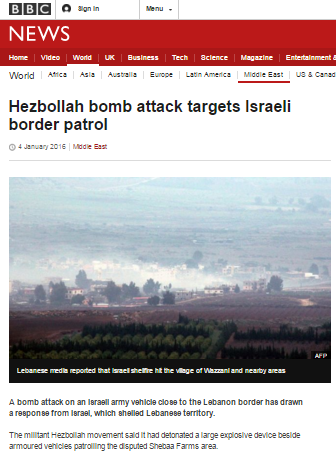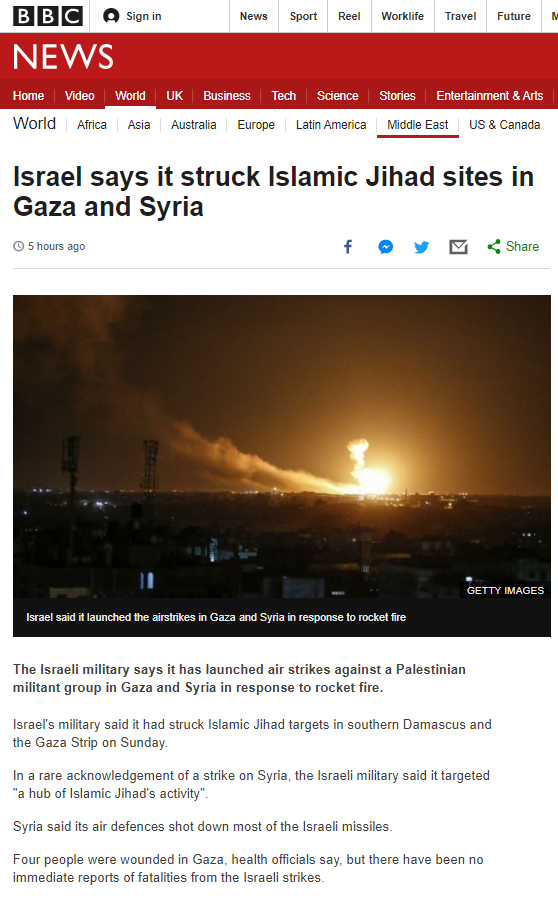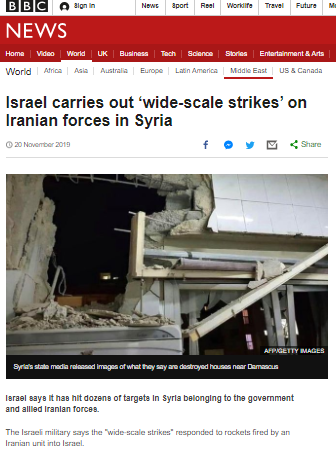The volume of Israel and Gaza Strip-related content appearing on the BBC News website’s Middle East page over the past few weeks has been so high that readers might have had difficulty keeping up with all the content published. One interesting item which may have slipped under the radar is titled “Gaza conflict: Disputed deadly incidents” and it appeared on July 31st.
In that article the BBC has collected two incidents (to date) which it describes as “disputed” with the introduction reading:
“Since the start of the Israel-Gaza conflict, there have been a series of deadly incidents for which each side has blamed the other. UN facilities serving as shelters are among the sites hit.
Here are some of the cases so far, where responsibility has been disputed.”
The first of the BBC’s “disputed” events is the explosion in the Shati area of Gaza on July 28th in which a missile fired by terrorists hit a playground killing ten people including eight children. As readers no doubt recall, soon after the incident took place the IDF stated that it had not been operating in the area at the time and publicized aerial photographs showing the trajectories of that missile and three others fired at the same time as recorded by IDF radars and sensors.
The BBC’s presentation of that incident, however, places data gathered from sophisticated tracking equipment on a par with the unverified verbal claims of assorted bodies all ultimately run by a proscribed terrorist organization.
“Gaza’s police, Civil Defence Directorate and health officials say Israeli air strikes caused the explosions. According to Al-Jazeera, Hamas denied it had fired any rockets from the area and said it was “categorically an Israeli air strike”. Hamas said it had collected shrapnel from the scene consistent with Israeli munitions, the channel’s website reported.
In a text message quoted by AP news agency, Hamas spokesman Sami Abu Zuhri described the incident as a “war crime” for which “the occupation” would pay the price.”
The second incident described by the BBC as “disputed” occurred on July 24th at a UN school in Beit Hanoun. Palestinian terrorists fired anti-tank missiles at IDF forces operating in the area from the vicinity of the school. The IDF returned fire and one errant mortar landed in the schoolyard, but filmed documentation showed that the schoolyard was empty at the time.
In this case too, the BBC presents audiences with a view which puts unproven claims made by a representative of a body run by a proscribed terrorist organization on a par with filmed evidence.
“Officials say the school was struck by three Israeli tank shells. Saed al-Saoudi, a commander of the Civil Defence in Gaza, told AP: “All the testimonies of the wounded, witnesses, paramedics and doctors confirm that the Israeli shells are the cause of this massacre.” “
It should of course be the aim of BBC journalists to cut through the propaganda of a terrorist organisation with a self-declared interest in promoting a public relations campaign based entirely on the inflation of civilian casualty numbers, in order to enable audiences to form a clear, fact-based understanding of events. Unfortunately for its audiences, the BBC has in far too many cases over the past few weeks elected instead to take the approach of presenting Hamas’ assorted unproven claims as plausible without making any effort to independently verify those assertions.
Moreover, the BBC has consistently refrained from providing BBC audiences with factual, comprehensive information on the use of the civilian population of the Gaza Strip as human shields and its presentation of these two clear examples of that practice as “disputed” further compounds that failure and actively hinders the ability of members of the audience to reach informed, fact-based opinions.
The BBC’s uncreative presentation of these two incidents in terms of “each side has blamed the other” may go a long way towards pandering to domestic fashionable relativism but it certainly does not do the job for which the BBC exists. But beyond the issue of the failure to meet its own public purpose remit, this article – like much other BBC reporting coming out of the Gaza Strip in the last few weeks – raises a very simple, yet troubling, wider question about BBC journalism.
If a Western government deliberately endangered civilians by placing military assets in residential areas on the premise that enemy forces would be less likely to strike back, the BBC would – one hopes – see it as its fourth estate duty to expose that practice. If a Western government launched missiles which fell short and killed children playing in a park, or drew fire by firing anti-tank missiles from the vicinity of a school, the damning headlines would – one assumes – soon follow.
The people of the Gaza Strip, who of course have no free press of their own, have not however seen any criticism – or even documentation – of their abuse by the terrorist organisations which hold them hostage from the Western journalists located there.
This article is what it looks like when the BBC chooses to waive its fourth estate role.




